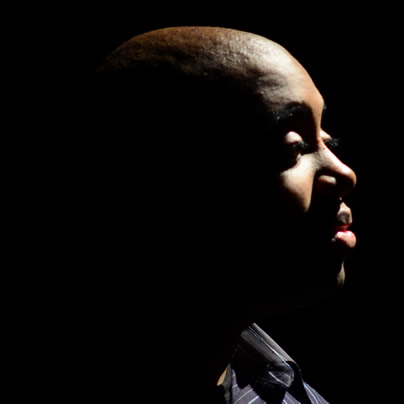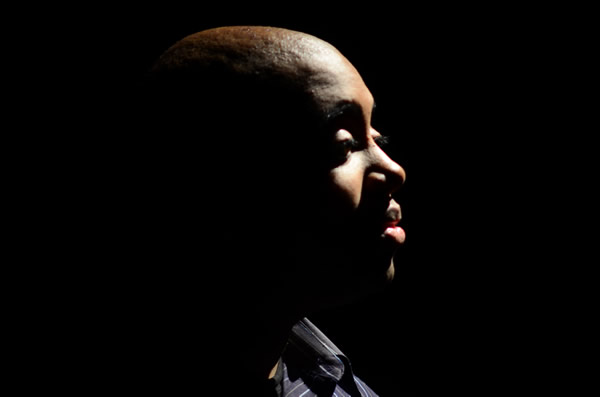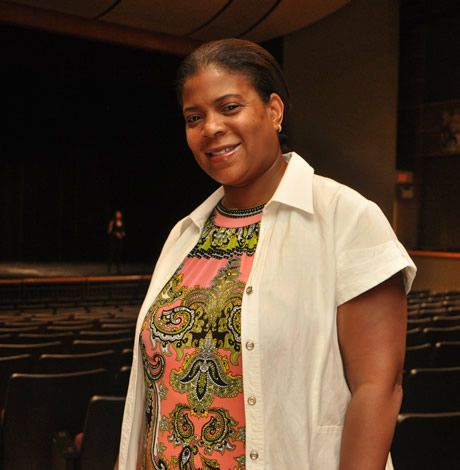Arts & Entertainment
Black and gay in D.C.
Theater festival features two playwrights tackling sexuality, AIDS on stage

DC Black Theatre Festival
June 23-July 1
‘Moments of Truth,’ June 30
9 p.m., Navy Memorial Theater
701 Pennsylvania Ave., N.W.‘11 x 8 ½ inches,’ June 29
9 p.m., Howard University Blackburn Center
2400 Sixth St., N.W.Ticket prices vary.
dcblacktheatrefestival.com
In the upcoming DC Black Theatre Festival, a commemoration of African-American culture and works, two playwrights seek to shine a spotlight on the black LGBT community.
Monte Wolfe and Alan Sharpe, both black D.C. playwrights, have focused their pieces on sexuality, love and dealing with the complications of HIV/AIDS. Their plays are being featured in the festival, which starts June 23 and runs through July 1 at various locations in the D.C. area.
“A problem is a lack in visibility,” says Sharpe. “Representations of black gays have been very limited, and in the past those characters were used as something to ridicule.”
Sharpe’s piece, “11 x 8 ½ inches,” is a series of short scenes that explores the lives of black gay men living in D.C. Each scene explores ideas of sex and sexuality, sometimes entering into the erotic, raunchy and romantic. The piece is being featured in the New Works Reading Series, a part of the festival that showcases new works by upcoming and established playwrights in the area.
Reginald Richards, a gay actor in Sharpe’s play, says the piece works to break stereotypes of the “typical gay man.”
“People expect us to be very flamboyant and really sexual,” he says. “It is important for people to see we come with all different personalities and different ethnic backgrounds.”
Wolfe’s play, “Moments of Truth,” is also a series of short scenes that show a variety of people dealing with the complications of HIV/AIDS and how it affects love and relationships. With a less than $1,000 budget, the minimalist style keeps the focus on the short but charged interactions between the characters.
“There is something for everybody in the show, whether you are black, white, gay or straight,” he says. “It is about connecting AIDS to sexuality and working through those problems.”
Wolfe was diagnosed with AIDS in late 2004. This helped trigger his interest in HIV/AIDS outreach, in which he created the Brave Soul Collective, a theater company, in 2006. The company focuses on plays with LGBT themes.
Sharpe has been writing plays with LGBT themes since 1992. Coincidentally, he was also diagnosed with AIDS the same year. He and Wolfe have collaborated on several works, and Wolfe is an actor in one of the scenes of Sharpe’s piece.
“Alan has always been a mentor to me,” says Wolfe. “He makes it clear to me the character I want to perform and what I want to write about in my plays.”
Sharpe says that the festival is a good opportunity to shed light on talent that might otherwise be overlooked.
“It is amazing to see artists travel from all over the country to join together for a few days,” he says. “It allows artists to reach a broader range of audience.”
Barbara Asare-Bediako, an actor in Wolfe’s piece, identifies as, “a woman who just loves a woman.”
“My ultimate goal is to make black theater and gay theater a normal thing,” she says. “I want it so we can turn on the TV and it would just be part of society.”
However she says it is still important to focus on talent coming from the African-American community, and doing HIV/AIDS outreach. Asare-Bediako has been involved with several outreach programs, including HIPS, to help prevent the spread of HIV/AIDS.
“I had a cousin who passed,” she says. “I found out months after it happened. My uncle, his father, acts like he never had a son.”
Asare-Bediako also cites the high HIV/AIDS rate in the District as an important factor to consider when selecting themes for the festival. The newly infected HIV/AIDS rate among African-American women has nearly doubled in D.C.’s poorest neighborhoods in the past two years, according to a recent Washington Post report.
Despite their focus on LGBT themes, Sharpe and Wolfe work to keep all kinds of audience members involved.
“We focus on the universal elements and not on division,” says Wolfe. “We cry, we laugh, we dream just like everybody else.”
Jared Shamberger, an actor in Wolfe’s piece who also wrote some of the scenes, says the piece includes a little bit of everything and expresses that everyone experiences powerful moments of truth.
“Even though we do primarily focus on LGBT themes, LGBT people have heterosexual friends and vice versa,” he says. “I don’t think you could present the LGBT story without including the heterosexual experience as well.”
One of his scenes is about a heterosexual couple that just had unprotected sex for the first time before they even went on a first date. They talk about where they are as a couple and about getting tested.
Shamberger agrees that including themes that deal with the HIV/AIDS rate is important.
“The HIV infection is not making headlines anymore,” he says. “People are getting infected everyday still, and I think it is something that people should be made aware of.”
Both pieces develop their themes through short scenes rather than a longer narrative arc. Wolfe says this makes the piece more powerful.
“I think it keeps people on their toes,” he says. “I don’t think I want the audience to get married to one particular character. I want them to see some bits of themselves in all the characters.”
Sharpe and Wolfe say that including LGBT themes in the theater is a great way to make people aware of the LGBT community by drawing them into characters’ lives.
“Gay people go through the same thing, they fall in love and they get heartbroken,” says Bediako. “People need to see these stories, see that gay people live normal lives, whatever normal is.”
Shamberger says it is impossible to write a play about the African-American community without including the LGBT community.
“I think if we are trying to present the landscape of black experience we have to include LGBT people as well,” he says.

Team DC, the umbrella organization for LGBTQ-friendly sports teams and leagues in the D.C. area, held its annual Night of Champions Awards Gala on Saturday, April 20 at the Hilton National Mall. The organization gave out scholarships to area LGBTQ student athletes as well as awards to the Different Drummers, Kelly Laczko of Duplex Diner, Stacy Smith of the Edmund Burke School, Bryan Frank of Triout, JC Adams of DCG Basketball and the DC Gay Flag Football League.
(Washington Blade photos by Michael Key)




















The 2024 National Cannabis Festival was held at the Fields at RFK Stadium on April 19-20.
(Washington Blade photos by Michael Key)
















Covering the @NatlCannaFest at RFK Stadium for @WashBlade . Stop by the LGBTQ+ booth and pick up a paper if you are here. pic.twitter.com/is7hnsaPns
— Michael Patrick Key (@MichaelKeyWB) April 20, 2024
Theater
‘Amm(i)gone’ explores family, queerness, and faith
A ‘fully autobiographical’ work from out artist Adil Mansoor

‘Amm(i)gone’
Thorough May 12
Woolly Mammoth Theatre
641 D St., N.W.
$60-$70
Woollymammoth.net
“Fully and utterly autobiographical.” That’s how Adil Mansoor describes “Amm(i)gone,” his one-man work currently playing at Woolly Mammoth Theatre.
Both created and performed by out artist Mansoor, it’s his story about inviting his Pakistani mother to translate Sophocles’s Greek tragedy “Antigone” into Urdu. Throughout the journey, there’s an exploration of family, queerness, and faith,as well as references to teachings from the Quran, and audio conversations with his Muslim mother.
Mansoor, 38, grew up in the suburbs of Chicago and is now based in Pittsburgh where he’s a busy theater maker. He’s also the founding member of Pittsburgh’s Hatch Arts Collective and the former artistic director of Dreams of Hope, an LGBTQ youth arts organization.
WASHINGTON BLADE: What spurred you to create “Amm(i)gone”?
ADIL MANSOOR: I was reading a translation of “Antigone” a few years back and found myself emotionally overwhelmed. A Theban princess buries her brother knowing it will cost her, her own life. It’s about a person for whom all aspirations are in the afterlife. And what does that do to the living when all of your hopes and dreams have to be reserved for the afterlife?
I found grant funding to pay my mom to do the translation. I wanted to engage in learning. I wanted to share theater but especially this ancient tragedy. My mother appreciated the characters were struggling between loving one another and their beliefs.
BLADE: Are you more director than actor?
MANSOOR: I’m primarily a director with an MFA in directing from Carnegie Mellon. I wrote, directed, and performed in this show, and had been working on it for four years. I’ve done different versions including Zoom. Woolly’s is a new production with the same team who’ve been involved since the beginning.
I love solo performance. I’ve produced and now teach solo performance and believe in its power. And I definitely lean toward “performance” and I haven’t “acted” since I was in college. I feel good on stage. I was a tour guide and do a lot of public speaking. I enjoy the attention.
BLADE: Describe your mom.
MANSOOR: My mom is a wonderfully devout Muslim, single mother, social worker who discovered my queerness on Google. And she prays for me.
She and I are similar, the way we look at things, the way we laugh. But different too. And those are among the questions I ask in this show. Our relationship is both beautiful and complicated.
BLADE: So, you weren’t exactly hiding your sexuality?
MANSOOR: In my mid-20s, I took time to talk with friends about our being queer with relation to our careers. My sexuality is essential to the work. As the artistic director at Dreams of Hope, part of the work was to model what it means to be public. If I’m in a room with queer and trans teenagers, part of what I’m doing is modeling queer adulthood. The way they see me in the world is part of what I’m putting out there. And I want that to be expansive and full.
So much of my work involves fundraising and being a face in schools. Being out is about making safe space for queer young folks.
BLADE: Have you encountered much Islamophobia?
MANSOOR: When 9/11 happened, I was a sophomore in high school, so yes. I faced a lot then and now. I’ve been egged on the street in the last four months. I see it in the classroom. It shows up in all sorts of ways.
BLADE: What prompted you to lead your creative life in Pittsburgh?
MANSOOR: I’ve been here for 14 years. I breathe with ease in Pittsburgh. The hills and the valleys and the rust of the city do something to me. It’s beautiful, it’ affordable, and there is support for local artists. There’s a lot of opportunity.
Still, the plan was to move to New York in September of 2020 but that was cancelled. Then the pandemic showed me that I could live in Pittsburgh and still have a nationally viable career.
BLADE: What are you trying to achieve with “Amm(i)gone”?
MANSOOR: What I’m sharing in the show is so very specific but I hear people from other backgrounds say I totally see my mom in that. My partner is Catholic and we share so much in relation to this.
I hope the work is embracing the fullness of queerness and how means so many things. And I hope the show makes audiences want to call their parents or squeeze their partners.
-

 South America4 days ago
South America4 days agoDaniel Zamudio murderer’s parole request denied
-

 Maryland5 days ago
Maryland5 days agoMontgomery County police chief discusses arrest of trans student charged with planned school shooting
-

 State Department23 hours ago
State Department23 hours agoState Department releases annual human rights report
-

 Theater4 days ago
Theater4 days ago‘Amm(i)gone’ explores family, queerness, and faith








